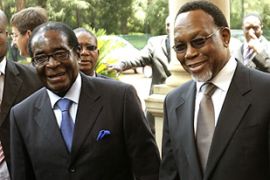‘Breakthrough’ in Zimbabwe talks
Opposition leader to become prime minister by February 11, regional bloc SADC declares.

MDC ‘reservations’
The SADC also agreed that control of Zimbabwe’s home affairs ministry should be divided between the ruling Zanu-PF and the MDC, or Movement for Democratic Change, for six months.
“All the parties expressed confidence in the process and committed to implementing the agreement,” Kgalema Motlanthe, South Africa’s president and the current SADC chair, said.
But the MDC said on Tuesday that the summit resolutions “fell far short” of what the party is looking for, and that it has not reached a decision on whether to accept the SADC’s position.
“Quite clearly, the conclusions reached as reflected in the communique fall far short of our expectations,” the party said in a statement.
“It is important that finality be brought to this issue and therefore our national council will meet this weekend to define the party position.”
Claude Colart, a journalist in Pretoria, told Al Jazeera: “I do not think that SADC has made a breakthrough on all fronts, but it needed to save face, hence the announcement on the prime minister’s post.”
Power sharing
A constitutional amendment would be passed to create the prime ministerial post on February 5, with Tsvangirai’s appointment finalised six days later, a SADC communique said on Tuesday.
The apparent breakthrough by SADC comes a day after delegates said no progress had been made on resolving disputes between Mugabe and Tsvangirai over the allocation of cabinet posts.
Both men signed a power-sharing deal brokered by Thabo Mbeki, the former South African president, in September but failed to reach a consensus on how to share Zimbabwe’s key ministries.
The deadlock has stalled the formation of a unity government which would see Mugabe remain as president and his rival become the prime minister.
The SADC talks come amid mounting international pressure for a solution to the crisis in Zimbabwe.
EU pressure
The European Union on Monday tightened sanctions on Harare by adding more than 60 pro-Mugabe officials and companies to a visa and assets freeze that bans them from travelling to or trading with EU nations.
The blacklist, which now totals 203 people and 40 entities, is aimed at increasing pressure on Mugabe to stand down.
EU officials said most if not all of the 40 entities on the blacklist were fake companies used to funnel money to prop up Mugabe’s government and supporters.
Western governments have repeatedly called for Mugabe to resign and are also pushing for major economic reforms to be implemented before aid is offered.
Power-sharing talks in Harare last week between Mugabe and Tsvangirai collapsed, highlighting the tensions between the leaders.
Tsvangirai has accused Mugabe’s ruling Zanu-PF party of trying to sideline the MDC adding that no deal is possible unless detained party activists are freed.